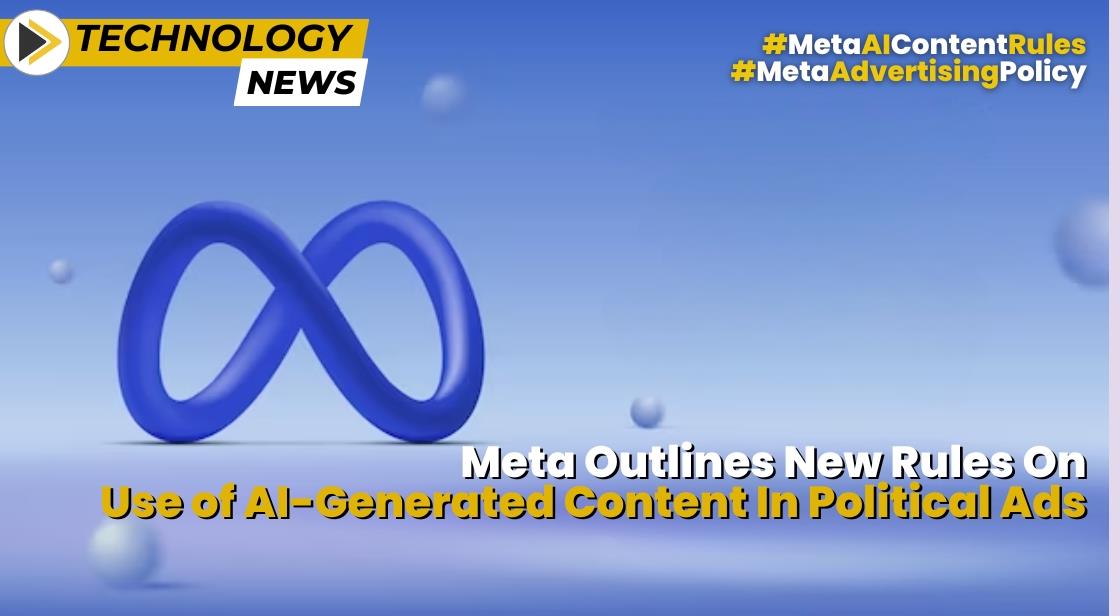Meta's Stricter Guidelines for AI-Generated Content in Political Ads: What You Need to Know

News Synopsis
Meta AI content rules,Political ads transparency guidelines,AI-generated content disclosure in ads,Meta advertising policy update,Social media AI regulations,Facebook and Instagram political ad guidelines,Transparency in political promotions,Meta enforcement on AI in ads,Preventing misinformation in political campaigns,Advertiser penalties for AI content violations
In a bid to address concerns surrounding the use of AI-generated content in political ads, Meta, the parent company of Facebook and Instagram, recently updated its terms and introduced new rules for advertisers.
These guidelines, set to be enforced globally from the new year, aim to prevent misleading information and ensure transparency in political promotions. Despite some initial implementation, Meta is now officially outlining specific rules and disclosures related to AI-generated content within political advertisements.
New Rules and Disclosures:
Meta's new policy mandates that advertisers disclose when a political ad involves digitally created or altered content using generative AI. The disclosures are required in scenarios such as:
-
AI-generated depictions of real individuals saying or doing things they did not.
-
AI-generated content featuring realistic-looking individuals or events that never existed.
-
Use of altered footage from real events in AI-generated ads.
-
AI-generated content depicting a realistic event that did not occur, presenting it as a genuine image, video, or audio recording.
Enforcement and Consequences:
To ensure compliance, Meta will add information to ads where advertisers disclose digitally altered or created content. This information will also be accessible in the Ad Library. Non-compliance may lead to rejection of the ad, with repeated violations resulting in penalties against the advertiser. The specific enforcement process during the ad creation phase will be shared by Meta in due course.
Why are these Disclosures Necessary?
Some may feel that these types of disclosures are unnecessary, especially given that most AI-generated content looks and sounds pretty clearly fake. However, political campaigners are already using AI-generated depictions to sway voters, with realistic-looking and sounding replicas that depict rivals. For example, a recent campaign by U.S. Presidential candidate Ron DeSantis used an AI-generated image of Donald Trump hugging Anthony Fauci, as well as a voice simulation of Trump in another push.
How will Meta Enforce these Rules?
If an advertiser discloses in the advertising flow that the content is digitally created or altered, Meta will add information on the ad. This information will also appear in the Ad Library. If Meta determines that an advertiser doesn't disclose as required, it will reject the ad, and repeated failure to disclose may result in penalties against the advertiser.
What are the Risks of Violating these Rules?
The risk of violating Meta's new rules is that your ad will be rejected, and you could have your ad account suspended for repeated violations.
How Could AI-Generated Content be Used to Sway Voters in the Final Days of an Election?
One example of how AI-generated content could be used to sway voters in the final days of an election is if a political candidate came up with a damaging AI video clip of a rival and paid to promote it on the last day of the campaign. Such a video could have a significant impact on the election, even if the ad account was suspended as a result.
Concerns and Potential Impact:
While these regulations aim to curb the influence of AI-generated content, concerns linger about their effectiveness. Political campaigners have already exploited such content to sway voters, creating realistic depictions of rivals. The risk of rejection and potential ad account suspension might deter advertisers, but the possibility of influencing voters remains.
Conclusion:
As Meta takes steps to combat the misuse of AI in political ads, the effectiveness of these regulations will be closely monitored. Striking a balance between freedom of expression and preventing misinformation is an ongoing challenge for social media platforms.









